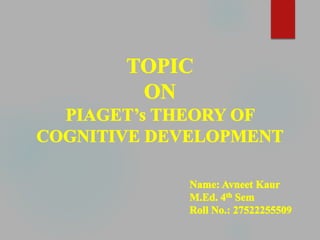
Piaget's Theory of cognitive development by Avneet kaur
- 4. Jean Piaget was born in Switzerland on August 9, 1896 and began showing an interest in the natural Sciences at a very early age. By the time Piaget had started his carrier as researcher. Piaget Continued to study the natural Sciences and received his doctorate in Zoology from the University of Neuchatel in 1918. While his early career consisted of work in the natural Sciences during the 1920’s he began to move toward work as a Psychologist. INTRODUCTION
- 6. There have been numerous bio-graphics written about Piaget’s life including “Conversation with Jean Piaget” by Jean Claude Bringvier (1980) and Jean Piaget “the man and his Ideas” by Richard Evans (1973). Piaget also wrote his Autobiography for a chapter in “History of Psychology in Autography” published in 1952. PIAGET BIOGRAPHICS GENERAL PRINCIPLES Piaget’s long standing interest in the development of children’s thinking actually began, in a way, in his own childhood, as he studied and wrote about birds. Piaget saw children as active participants in their own development. He rejected the idea that cognitive structures some how slowly emerge. Instead Piaget believed that the children construed their own mental structures, the building blocks of cognition and intelligence, through a constant and active series of intelligence interactions with their environment.
- 8. 1. Schemas:- Piaget was of the view that every individual has his own pattern of behaviour, when he deals with objects, individuals and situations in life these are called schemas. The schemas are of the two types:- 1) Behavioural Schemas 2) Cognitive Schemas PIAGET’S BASIC CONCEPTS
- 10. PIAGET’S BASIC CONCEPTS 2. Assimiliation:- This concept of Piaget comes into operation when the child uses his schema already present in his mind our a new problem, subject or situation. The child tries to incorporate the new sub object or event in the existing scheme in his mental make up. This assimilation involves adjusting new information in the existing scheme in his mental make up.
- 11. 3. Accommodation:- It means making changes in the existing schema to fit in new ideas or objects. The child may imitate others, may suppress own schema and this show a tendency towards accommodation. 4. Equilibration:- This word is based on the word ‘equilibrium’ which means a state of even mental balance. When the child faces & new problem and his existing schema does not work this state of affair being out disequilibrium in the mind of the child. At this stage the child has to focus modifies his old schema to suit the new situation. This situation, according to Piaget, enables the child to learn and grow.
- 16. STAGES OF COGNITIVE DEVELOPMENT Piaget described four major periods of development:- 1. The Sensorimotor Stage:- (0-2 years) • Intelligence is demonstrated through motor activity. • Knowledge of the world is limited because its based on physical interactions. • Children acquire object permanence at about 7 months of age. • Physical development allows the child to begin developing new intellectual abilities.
- 22. 2. The Pre-operational Stage:- (2-7 years) • Animism- the belief that everything that exists has some kind of consciousness. • Vocabulary is expanded and developed • Egocentric thinking predominates. • Memory and imagination are developed, but thinking is done in a nonlogical, nonconservation, nonreversible manner.
- 28. 3. The concrete operational Stage:- (7-11 years) • During this stage, the thought process becomes more rational. • The child has the ability to develop logical thought about an object. • The child understands the concept of conservation, reversability, weight, area, volume.
- 29. 4. Formal operational Stage:- (11 -16 years) • In the stage, individuals move beyond concrete experiences and begin to think abstractly, reason logically and draw conclusions from the information available. • Adolescents begin to think more as a scientist thinks. • Devising plans to solve problems and systematically testing solutions.
- 30. CONTRIBUTION TO EDUCATION (Educational Implications) 1. Curriculum Planning:- Piaget’s theory provides a suitable frame work of the learning experiences in view of the cognitive development of children. It is helpful in curriculum planning. Since children of a particular region tend to reach a particular stage in their intellectual development what is to be planned in their curriculum of studies must always be in accordance with the expected level of mental abilities. 2. Child Centered Education:- Piaget’s theory emphasises pupil-centered education. It has advocated need for tailoring the education of a child according to the level of functioning of his cognitive structure.
- 31. 3. Appropriate and stimulating environment:- As Piaget theory considers both physical and social experiences as quite essential for a child's intellectual development. It has placed an important responsibility on parents and teachers to arrange for the most appropriate and stimulating environment for their children. 4. Importance of drives and motivation:- Piaget theory has highlighted the importance of drives and motivation in the field of learning and development. It has utilised the concept of equilibration for this purpose. 5. Variety of aid material:- The theory exphasises the importance of the variety of aid material in teaching learning process. Teaching learning process should not be confined to the use of verbal communication, but should involve other symbolic expressions.
- 32. 6. Self learning:- Children should be encouraged to experiment with materials in order to accommodate new understanding and to acquire new learning b them selves. Teacher should try to set up environment in which the students can have a wide variety of experiences for self learning. 7. Acquaintance with thought process:- Piaget theory acquaints teacher s and parents with the thought processes of children at a particular level of their maturation. 8. Practical interpretation of Intelligence:- Piaget defined and interpreted intelligence in a practical way. Intelligence in terms of cognitive structure and functioning helps the person in making struggle for survival and seeking adjustment with the environment.